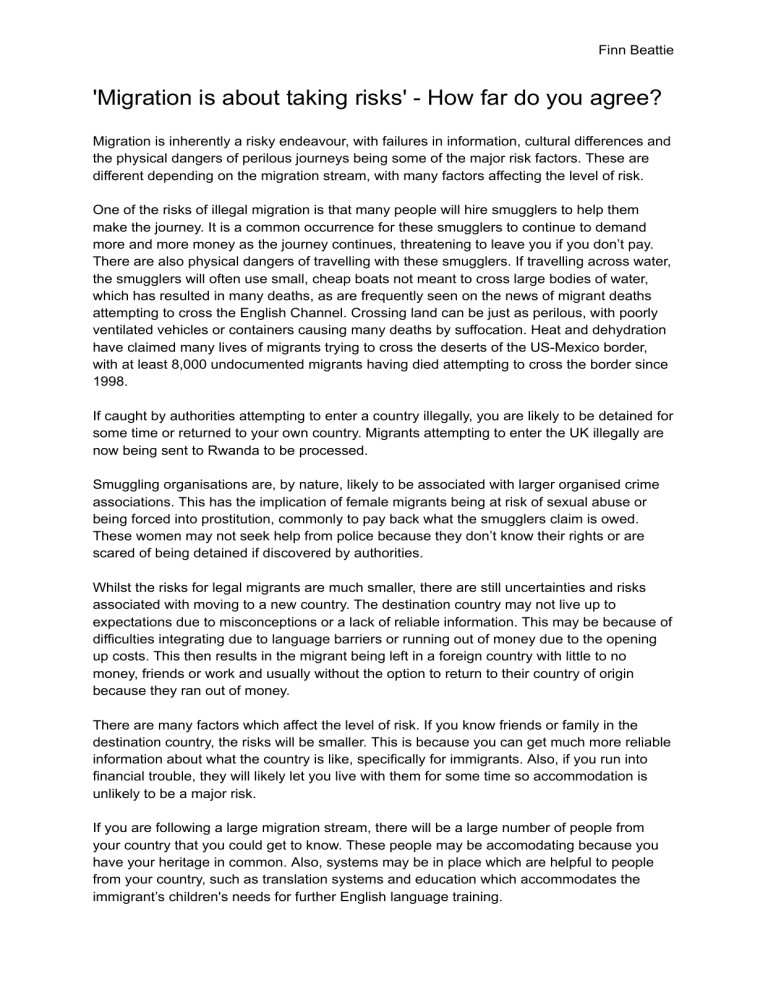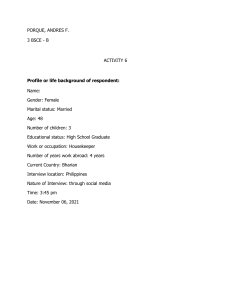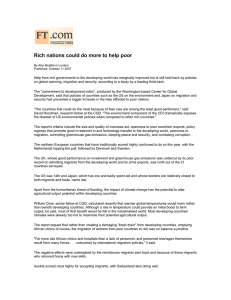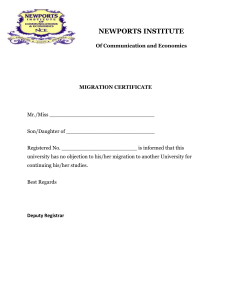
Finn Beattie 'Migration is about taking risks' - How far do you agree? Migration is inherently a risky endeavour, with failures in information, cultural differences and the physical dangers of perilous journeys being some of the major risk factors. These are different depending on the migration stream, with many factors affecting the level of risk. One of the risks of illegal migration is that many people will hire smugglers to help them make the journey. It is a common occurrence for these smugglers to continue to demand more and more money as the journey continues, threatening to leave you if you don’t pay. There are also physical dangers of travelling with these smugglers. If travelling across water, the smugglers will often use small, cheap boats not meant to cross large bodies of water, which has resulted in many deaths, as are frequently seen on the news of migrant deaths attempting to cross the English Channel. Crossing land can be just as perilous, with poorly ventilated vehicles or containers causing many deaths by suffocation. Heat and dehydration have claimed many lives of migrants trying to cross the deserts of the US-Mexico border, with at least 8,000 undocumented migrants having died attempting to cross the border since 1998. If caught by authorities attempting to enter a country illegally, you are likely to be detained for some time or returned to your own country. Migrants attempting to enter the UK illegally are now being sent to Rwanda to be processed. Smuggling organisations are, by nature, likely to be associated with larger organised crime associations. This has the implication of female migrants being at risk of sexual abuse or being forced into prostitution, commonly to pay back what the smugglers claim is owed. These women may not seek help from police because they don’t know their rights or are scared of being detained if discovered by authorities. Whilst the risks for legal migrants are much smaller, there are still uncertainties and risks associated with moving to a new country. The destination country may not live up to expectations due to misconceptions or a lack of reliable information. This may be because of difficulties integrating due to language barriers or running out of money due to the opening up costs. This then results in the migrant being left in a foreign country with little to no money, friends or work and usually without the option to return to their country of origin because they ran out of money. There are many factors which affect the level of risk. If you know friends or family in the destination country, the risks will be smaller. This is because you can get much more reliable information about what the country is like, specifically for immigrants. Also, if you run into financial trouble, they will likely let you live with them for some time so accommodation is unlikely to be a major risk. If you are following a large migration stream, there will be a large number of people from your country that you could get to know. These people may be accomodating because you have your heritage in common. Also, systems may be in place which are helpful to people from your country, such as translation systems and education which accommodates the immigrant’s children's needs for further English language training. Finn Beattie Distance decay is also likely to be a factor affecting not only the number of people in the migration stream but the level of risk, with information being much more reliable for someone migrating from Syria to Turkey than from Nigeria to the UK. Also, this ties into the previous paragraph, as distance decay will decrease the number of people from your country. Internal migration will likely have much less risk because of the ease of access to information about the other regions within your country. However, this can vary from country to country, with some countries having very different cultures across their different regions; many African countries such as Chad, Cameroon and Nigeria are prime examples of this, with cultures varying massively within their borders. However, with the rise of the internet and globalisation improving the information available to migrants, the risks of migration are decreasing. This does not change the fact that there are still many risks with migration, especially when attempting to do so illegally, so I would conclude that migration is still largely about taking risks.





